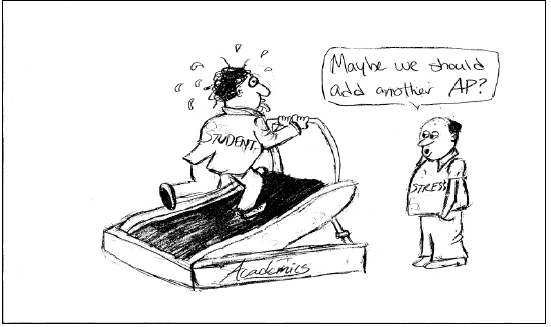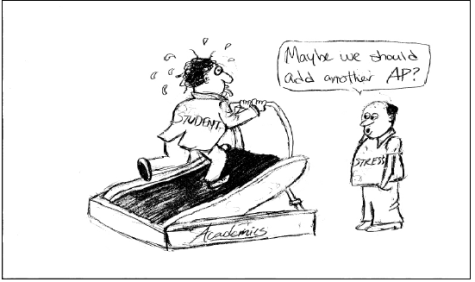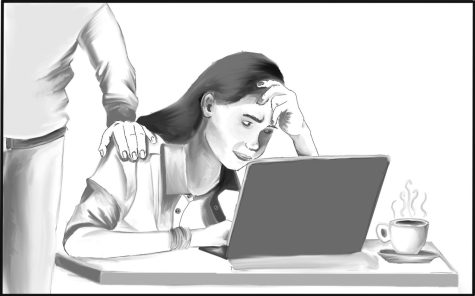With Increased Academic Pressure, Stress is a Mental Health Issue

Image by Jinle Zhu.
Nationally, levels of teen stress are on the rise. The American Psychological Association’s 2014 Stress in America survey found that millennials were the most stressed generation.
One potential stressor for students is the increasing competitiveness of college admissions and the pressure to take more rigorous classes. At BHS, this pressure may be particularly strong as the administration has sought to increase AP enrollment by offering more AP classes and encouraging more students to challenge themselves.
School staff identify a variety of factors contributing to the generally high self-reported stress levels of BHS students.
School psychologist Kevin Kemelhar said the number of higher level classes are not necessarily to blame.
“Students who are taking too many higher level classes probably have stress,” he said. “Also, students who shouldn’t be in higher level classes, but are, they [also] have higher levels of stress.”
Sophomore Mukul Govande said he is extremely busy due to both academics and activities.
“Because of sports and advanced classes,” Govande said, “I occasionally have to stay up till 2:00 a.m., just to finish my homework. I have to get up at 5:30 [a.m.] every single day to get to my bus.”
Sophomore Jack Spero added that extracurriculars also cause a great amount of stress.
“During the fall, with both cross country and band occurring simultaneously, there were nights when I had to go to bed extremely late,” he said.
Lewis & Clark Graduate School Assistant Professor Mollie Galloway, Villanova University Assistant Professor of Education Jerusha Connor and Stanford Graduate School Senior Lecturer Denise Pope found that students with more homework had higher stress levels.
“Students who did more hours of homework experienced greater behavioral engagement in school but also more academic stress, physical health problems, and lack of balance in their lives,” they wrote.
The causes of high stress levels are often more than what appears on the surface, sophomore Claire Bruening explained.
“Academic pressures greatly affect my stress levels because [they] ask for a level of ‘perfection’ and [have] you competing with your peers [to whom] you are constantly compared,” she said.
Both Bruening and Spero said that they are each scheduled to take four AP classes their junior year. Govande said he will take five APs his junior year. All three are also participating in band.
Senior Ryan Reilly took six AP classes this year, and shared his strategy for managing stress levels.
“I think the best way to do it is to prioritize your work the right way,” he said. “Make sure you get your work completed ahead of time. I haven’t done that enough for any of the four years [of high school], but [starting assignments earlier] makes it much easier.”
Reilly added that, while he often felt stress, he still thinks it is good to take on a more challenging course load.
“I think the benefits of the education [outweigh] the harms of stress. I think it’s a fair trade off,” he said.
However, in another study, education professors Shannon Suldo and Elizabeth Shaunessy-Dedrick of the University of South Florida found that students in more academically rigorous classes were not necessarily more unhappy.
While the students in these challenging classes reported more stress, “the psychological functioning of students in AP and IB is similar or superior to the levels of psychopathology, life satisfaction, and social functioning reported from their peers in general education.”
Nicholette Leanza, a psychotherapist at Psychological & Behavioral Consultants in Beachwood, said signs of academic stress include headaches, stomach aches and irritability.
She explained the stress could also potentially break down an individual’s immune system, “[leading them] to be more susceptible to colds.”
Leanza suggested that students employ time management skills and prepare in advance for assignments.
“It’s always very helpful to be prepared,” she said, adding that students should get “good sleep” and not work overnight.
If parents, teachers or friends suspect an individual possesses academic stress, Leanza recommended bringing it to his or her attention, as she said some are often unaware of the source of stress.
“Be a support to them,” she said.
Guidance counselor Carol Grooms acknowledged the growing problem of school stress.
“There has definitely been an awareness surrounding the amount of stress imposed on students with extremely rigorous schedules.”
Guidance counselor Meghann Sullivan also noted that academic stress may, in part, be due to the fact that competition for college admissions has increased.
“[The Ohio State University’s] admission standards have risen drastically compared to the past generation,” she said. “It is becoming more competitive because the pool of candidates is increasing. You are competing against the world for the same spot.”
It is becoming more difficult to make it in the world without a college diploma, Grooms explained.
“From my perspective, it has become increasingly more difficult to maintain a desired standard of living with a high school diploma,” she said. “Students are expected to enter the job market with a higher level of education.”
Kemelhar said there are some signs that can be identified to know when someone is struggling with stress levels.
“[Students are] over tired, not eating right and not able to concentrate,” he said. “Social relationships may take a decline, [they also might show] irritability. How they typically are, they’re not.”
“People have to know it’s okay to accept a challenge, but a reasonable challenge,” Kemelhar said.













